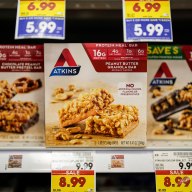Fran Drescher’s dedication to eradicating cancer is a personal one. After a series of misdiagnoses by a number of doctors, Drescher was diagnosed with uterine cancer in 2000. In 2002, she wrote “Cancer Schmancer” about her experiences, and while on her book tour met many women who said her journey mirrored their own. Inspired, Drescher started the Cancer Schmancer movement and Cancer Schmancer Foundation to advocate prevention methods and early detection.
Part of her organization’s prevention programs is Trash Cancer, which offers guidance on living a toxin-free lifestyle, starting with the products we buy. Now, Drescher is also lending her support to the Carcinogen-Free Label Act, a bipartisan bill introduced to Congress that seeks to create a label similar to the “organic” label that tells shoppers a product is free of cancer-causing agents. We asked the actress and activist to tell us more about her mission.
Why does toxic-free living start in the home?
The place we spend the most time in is our home, and that’s the place that we have the most control over. Rather than feeling scared as we see cancer closing in around us, why not do something about it? Being proactive and living a more preventative, healthier, toxic-free lifestyle is a very important component and complement to all the research that’s being done. Since Nixon waged the war on cancer, the bulk of the money has been gone into finding a cure, which in many ways is kind of like closing the barn door after the horse has bolted.
So how can we get involved?
We want Americans to use the power of consumerism and to not only detox their home and reduce their risk of cancer but also give a loud message to manufacturers. They’ll sell us whatever we want to buy, so this is where the Carcinogen-Free Label Act comes into play. … Good health is the great equalizer and the beauty of this bill is that it’s non-regulatory, it means we’re not trying to skip enough legislation to make it more difficult for manufacturers to make stuff — which costs money, gets a lot pushback, isn’t necessary. We all agree that a cleaner, less polluted world is in the best interest of everyone. … [We want to] make “Detox your home” the “Don’t drink and drive” of the millennium. It’s a call to action, and once you wake up and smell the coffee, it’s hard to go back to sleep.
What do you envision the label being?
The consumer doesn’t have to go to MIT to understand the ingredients on the back label. All they have to do is look at what essentially is the carcinogen-free label which is like a Good Housekeeping seal of approval. And that will cover everything that we talk about at Cancer Schmancer. What are you putting in your mouth? What are you putting on your skin? What are you cleaning and gardening with? Let’s start there. … I tell every man I know, don’t use antiperspirants. You are creating a situation that deprives the body of one of its its most effective functions of detox, which is perspiring under your arms. Go to the men’s room and wash your pits twice [instead]. You’re a human being and it’s a very important body function. More and more men are getting breast cancer. You wouldn’t do it to an animal — paint their skin with something that would deny them the ability to let the skin function in a most natural and effective way, which is to release toxins.
Why do you think America is behind other countries in banning these ingredients?
The minute you start to get regulation involved, you’ve got big business, lobbyists with very deep pockets that move the roof on Capitol Hill. That’s why I say [our bill] is non-regulatory. This is coming in from another doorway. Everybody has a vote and everybody has a right to buy what they want to buy.
What if people don’t think they have the power to make change?
We were one of the NGOs that put pressure on Johnson & Johnson. They are an enormous company and once everyone caught wind of the fact that the No More Tears shampoo — that we were being told for generations is so safe for babies — is loaded with formaldehyde, much to their credit, they changed their formula. It does work. At the end of the day consumerism and purchasing power is all you need. It’s about rallying together, getting the word out, making it easier for Americans to make a healthier choice because it’s our right to be able to buy something for our family that is not going to harm us.
What about people who say that it’s just trace elements of these ingredients that wind up in our bodies?
Eighty thousand chemicals are being actively used every day and no one knows whether they’re carcinogenic, in what amount, in combinations with what other products. It’s not just your product I’m using. You hear it all the time when you go to the doctor, [they say] “It’s such a small amount of radiation, it’s nothing,” except that it’s something that’s equivalent to a chest X-ray. It’s so pervasive. It’s the amount of stuff.
Do you have any tips for people who want to start living a less-toxic lifestyle?
The more planted and organic food you can eat, and local, pesticide-free, the better. When you eat a strawberry that’s not organic, you might as well be eating a sponge soaked in pesticides. We’re hurting only ourselves. Steer clear of antiperspirants. What kind of toothpaste are you using? Gums are the gateway to a lot of disease. What do you clean with? The stronger the smell is, that’s not good for you.
When we buy products, what should we look for?
Anything that’s eco-friendly. If you can understand the labels, you’re much better off. Go to the Cancer Schmancer website, put in products that you’re using that you’re curious about. Maybe it’s something that your mom and grandmother have used that makes you feel all warm and fuzzy inside. See how we rate it. You may be very surprised and it may be enough to make you want to try going in another direction. Danger’s on the horizon. All we’ve figured out how to do is live longer chronically ill. The present Cancer Panel of 2010 said that there’s not gonna be a cure, it’s just gonna mutate, it’s just gonna change its profile. It’s unending. Our little bodies are completely in harmony with nature. We’re in complete disharmony with the intensity of chemicals that imploded the 20th century with very little restriction or regulation.
















